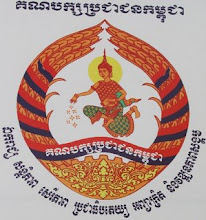On March 11, 2010 the National Assembly of the Kingdom of Cambodia passed the anticorruption law with the support of 82 on 82 voices present and on March 19, the Senate also approved the law with 52 voices on 53. The law is very important in the fight against corruption which is a great obstacle for national development but also a judicial tool for strengthening democracy and social stability. It should be affirmed that the Royal Government paid great attention to the drafting of anticorruption law that included inputs and modifications in cooperation with various organizations such as JICA, UNDP, USAID and DANIDA, as well as contributions from state institutions, non-governmental organizations and some of the world’s famous experts. The law is born from of the concentration of intelligence from all sectors of society, the international community as well as experiences gathered from other countries, which make it a world standard and typical to the situation of the Cambodian society.
The fight against corruption is a part of the Royal Government’s program for state reforms so as to guarantee good governance, to improve public services, to strengthen social justice and equity, to develop a sustainable economy and to improve the people’s living condition as a whole. The Royal Government’s strategy in the fight against corruption focuses on three essentially inter-related elements – education for the prevention, law enforcement and suppression of corruption offenses with massive participation and support. So far the Royal Government has taken various measures against corruption by putting in place relevant mechanisms such as the Ministry of Relations with the National Assembly, the Senate and Inspection, the National Auditing Committee and the Anti-Graft Unit, etc. Through these mechanisms and together with other competent institutions, various achievements have been scored in the fight against corruption and a number of offenders have been arrested and brought to trials. However, for the achievement of high efficiency there needs to have this Anticorruption Law as a judicial tool for determining on mechanism, punishments and legal measures in suppressing corruption offenses.
Some in ill-intent circles and opposition circles have criticized and accused the draft law to be of shortcomings and that it would not be able to protect the people’s interest. They verbally attack the Royal Government for not expediting the law organization but when the National Assembly was ready to convene the meeting on the bill, they backtracked to demanding for more time on the pretext that the timeframe provided was too short that MPs could not give it a thorough study and the civil society organizations were not able to comments. They criticized the law as lacking clarity while interpreting various points of the draft law to their ill-intent positions. Moreover, representatives of the opposition parties walked out of the session of the National Assembly that was in motion to adopt the law. This has clearly illustrated lack of responsibility from their parts for national and people interests. At the same time UNCT has issued an embarrassing statement seen to have exceeded its mandate and to interfere in the Cambodian internal affairs.
It is no different to Governments in other democratic countries the Royal Government of Cambodia governs by existing laws, decrees and purviews. Before becoming laws in force, all bills have to be brought for thorough debates in sessions of the National Assembly where all people’s deputies from all political parties with seats in it are entitled to expressing their opinions, whereas in the final stage, decision is up to the adoption session of the National Assembly in accordance with the rules defined by the Constitution and its internal regulations. No democratic country that is required to give the opposition and the civil society more time to study further any draft laws, while the bill has had its passing through various stages in its formation and debates among all concerned circles.
In short, the recently adopted Anticorruption Law by the National Assembly has got qualification that is responding to the wish of national and international community and in conformity with the Cambodian situation. With the law adopted, the Cambodian society will realize more justice, equity, dignity, harmony and progress. It should be understood that the law would not bear efficiency by itself, but would depend on execution with conscience and responsibility of human in both state and private ministries and institutions.
Therefore, the prime task is to promote education and awareness of the law among people, government officials, armed forces, businessmen, traders, investors and circles in society to achieve a good understanding and to move for active implementation. Especially, it is actions taken by the Royal Government in implementing the law with a sharpened and determined political will that are primary factors for the achievement of efficiency of the law. It is in this spirit that the people of Cambodia place their trusts on Samdech Techo Hun Sen in the efforts to win more successes in the battle against corruption.





No comments:
Post a Comment